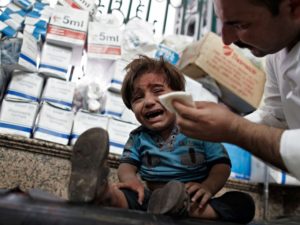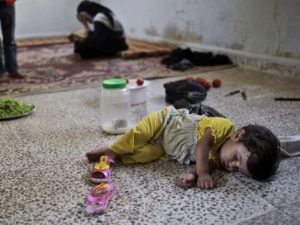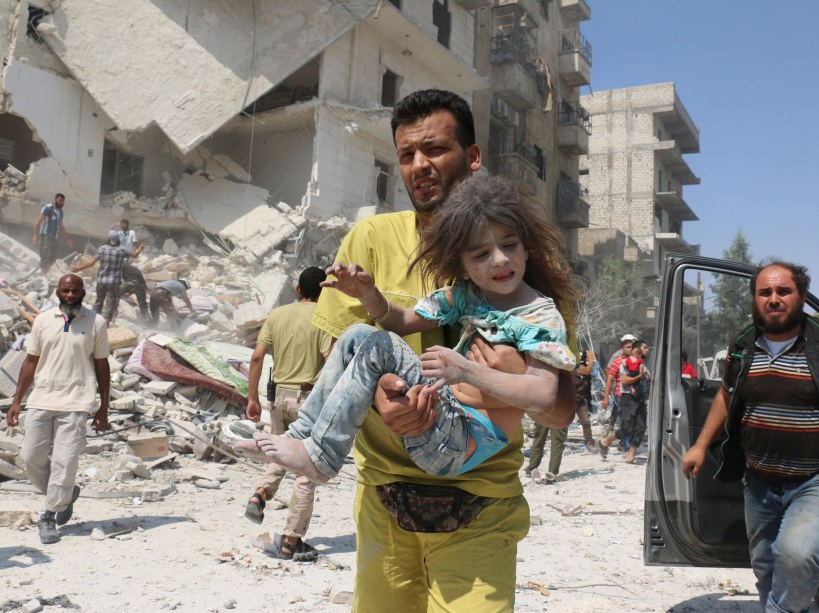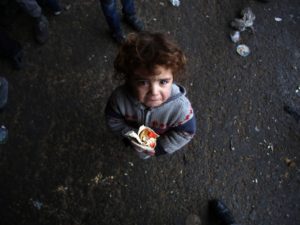Non-compliance with human rights and international humanitarian law continues to worsen in Syria; after nearly six years of war, Syrian children are down to their last ounce of strength. They sleep in ruins, they are cold and starved, they have witnessed the inconceivable. Every child in Aleppo is experiencing psychological trauma because of the lethal violence which has brought bloodshed to this great Northern city in Syria. They are the victims of indiscriminate bombardments against civilians. War, bombs, chemical attacks all play their part in the day to day lives of these children. According to a recent report by Human Rights Watch, a new chemical attack is said to have been committed in the city of Aleppo in November 2016, killing at least nine civilians, including four children and resulting in around 200 injured (HRW, 2017).
Intolerable and recurring situations.
For centuries, Aleppo has been one of Syria’s biggest cities, with a population of 2.1 million inhabitants in 2004 – nearly as many as Damascus, the capital (Duran & Dagorn, 2016). However, five years after the protest movement in 2011 to which the Bashar Al-Assad regime responded with weapons, war has devastated the city. According to the White Helmets’ Organization for Civilian Protection, Russian airstrikes against the city of Aleppo in 2016 alone have killed 1,207 civilians, including 380 children (Radio-Canada & Agence France-Presse & Reuters, 2016).
Human Rights Watch (HRW) wrote a report accusing the Syrian government and its allies of having launched at least eight chlorine gas chemical attacks against residential areas in East Aleppo, in order to regain control, between November and December 2016, after a period of relative calm (HRW, 2017). The offensive continued until December 13, when the parties agreed on a ceasefire, according to Human Rights Watch (2017).
These attacks have caused the death of nine civilians, including four children and has also resulted in injuries. One of the deadliest attacks struck the neighbourhood of Al-Sakhour on November 20, killing six members of the same family (HRW, 2017).
According to a rescuer present on the scene: “Persons who were affected experienced  difficulties breathing, coughed violently, experienced nausea, some fainted, others were frothing at the mouth […] The children are affected the most by these chemical products…They inhale the odours and end up suffocating” (HRW, 2017).
difficulties breathing, coughed violently, experienced nausea, some fainted, others were frothing at the mouth […] The children are affected the most by these chemical products…They inhale the odours and end up suffocating” (HRW, 2017).
The UN Security Council, including Russia, condemned the use of all toxic chemicals, including chlorine, as weapons in Syria, highlighting the fact that those responsible will be held accountable. On August 7, 2015, the Security Council unanimously adopted Resolution 2235 establishing an inquiry to “identify in any way possible the people, entities, groups or governments which have perpetrated, organized or financed the use of chemical products, including chlorine or any other toxic chemical as a weapon in the Arab Republic of Syria” (HRW, 2017).
Aleppo at the centre of a humanitarian disaster
 Despair reigns in Aleppo. Children are experiencing psychological trauma because of the fatal violence causing bloodshed in this great Northern city in Syria, where the regime and rebels are fighting a merciless battle. “All the children in Aleppo are suffering. All of them are traumatized” stated the Chief of the United Nations Children’s Fund in Syria, Radoslaw Rzehak, to AFP (AFP, 2016).
Despair reigns in Aleppo. Children are experiencing psychological trauma because of the fatal violence causing bloodshed in this great Northern city in Syria, where the regime and rebels are fighting a merciless battle. “All the children in Aleppo are suffering. All of them are traumatized” stated the Chief of the United Nations Children’s Fund in Syria, Radoslaw Rzehak, to AFP (AFP, 2016).
Years wasted in a conflict they are in no way responsible for, but for which they are paying a high price: malnutrition and dehydration, no access to education and appropriate healthcare, forced displacement, all within a full-blown humanitarian crisis.Nothing can justify such attacks against children and such disrespect for human life.
Grains of hope
The incalculable destruction waged against Aleppo has targeted its population as well as its history. Currently, the Eastern district of Aleppo is at the hands of the Syrian army and its former inhabitants are reinvesting little by little their former living spaces.
On February 23rd, the United Nations Commission on Human Rights held an extraordinary session on the situation in Syria in Geneva in order to bring an end to the illegal attacks, to guarantee access to humanitarian aid as well as grant safe passage for civilians fleeing for their lives, but also to defend the rights of prisoners and to ensure justice and reform in the security sector (Human Rights Watch, 2017).
Currently, 59 countries have also approved the international policy agreement known as the Safe Schools Declaration. By approving this declaration, countries commit to re-establishing access to education when schools are being bombarded, burnt and destroyed during armed conflicts and they are committing to ensuring that the students, teachers and schools are safe. They are agreeing to dissuading this violence by promising to enquire and pursue crimes of war involving schools, and to reduce to a minimum the use of schools for military purposes so that they do not become targets (Human Rights Watch, 2017).
Humanium is also committed to respecting children’s rights across the world. We support sustainable and fair development, by using a global approach, focused on mutual aid, participation and autonomy for the most vulnerable. Currently, we are looking at options for collaborating with a Syrian NGO in order to support children on the ground. We are also considering other partnership options with the UN.
Written by : Mahaliana RAJAONARIVO Translated by : Alexandria Harris Proofread by : Salomé Guibreteau |
AFP. (2016, December 12). “Tous les enfants d’Alep sont traumatisés”, selon l’Unicef. Retrieved from Le Parisien: http://www.leparisien.fr/laparisienne/sante/tous-les-enfants-d-alep-sont-traumatises-selon-l-unicef-12-12-2016-6446382.php
Durand, A.-A., & Dagorn, G. (2016, Décembre 15). Syrie : à quoi ressemblait la ville d’Alep avant la guerre ? Retrieved from Le Monde: http://www.lemonde.fr/les-decodeurs/article/2016/12/15/a-quoi-ressemblait-la-ville-d-alep-avant-la-guerre_5049471_4355770.html
HRW. (2017, February 21). La France et le Canada sont les 58ème et 59ème pays à approuver la Déclaration sur la sécurité dans les écoles. Retrieved from Human Rights Watch: https://www.hrw.org/fr/news/2017/02/21/la-france-et-le-canada-sont-les-58eme-et-59eme-pays-approuver-la-declaration-sur-la
HRW. (2017, February 13). Syria: Des attaques chimiques ont été menées de manière coordonnée contre Alep. Retrieved from Human Rights Watch: https://www.hrw.org/fr/news/2017/02/13/syrie-des-attaques-chimiques-ont-ete-menees-de-maniere-coordonnee-contre-alep
HRW. (2017, February 21). Syria: Faire des droits humains une priorité des pourparlers de Genève. Retrieved from Human Rights Watch: https://www.hrw.org/fr/news/2017/02/21/syrie-faire-des-droits-humains-une-priorite-des-pourparlers-de-geneve
Radio-Canada & Agence France-Presse & Reuters. (2016, December 15). Premières évacuations à Alep-Est. Retrieved from radio-canda.ca: http://ici.radio-canada.ca/nouvelle/1006033/cessez-le-feu-alep-syrie-guerre-evacuation-treve



